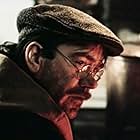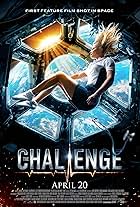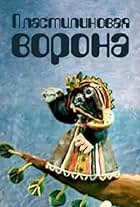IMDb RATING
6.5/10
3.3K
YOUR RATING
In 1945, Soviet war hero Ignat is sent to work as a locomotive mechanic in a Siberian labor camp where he meets an assortment of Germans and Russians.In 1945, Soviet war hero Ignat is sent to work as a locomotive mechanic in a Siberian labor camp where he meets an assortment of Germans and Russians.In 1945, Soviet war hero Ignat is sent to work as a locomotive mechanic in a Siberian labor camp where he meets an assortment of Germans and Russians.
- Awards
- 9 wins & 16 nominations total
Featured reviews
I watched the whole thing for the sake of the main character, who I REALLY shouldn't have felt was in any way attractive (he's basically a brute). Maybe, if I'd watched it at another point in the month, I'd have felt differently and turned it off instead of watched it until the end, for if I saw such a man looking at me with such a hard, angry expression as he wears most of the time, I'd likely move away from him. I have zero interest in trains, so nothing with them excited me. So, the film became more about the drama between dirty, miserable, mean, predatory people who mostly seemed to dislike each other even when "friendly," in a sexual relationship, doing favors, whatever. Maybe that was the point. That being said, while I hated their discrimination, ignorance, and mob mentality, I feel for people having to live under those conditions, as such conditions help create such people. Ultimately, it was interesting from a cultural aspect. But that's about it. S/N: Also, the Russian girlfriend was pretty and had a nice figure.
10jmaggot
Saw the film last night at the Aero Theater in Santa Monica as part of a special Golden Globe viewing. The subject matter of German/Russian relationships, especially during WWII were some of the darkest moments in either countries histories, so this is not an easy subject for film. I was expecting something dark and brutal, which was not the case. This film utilizes black humor very well, akin to the Czech Film Divided We Fall, but it is not a comedy. The relationship between Germany and Russia before, during, and after WWII, including what the governments want us to believe is skilfully examined via the universal truths of the human experience of the characters in the film. Although this is a Russian film, this does not mean the film is any less relevant to a German audience. You do not need to know a lot of Russian German History to understand the film, but there is one key date you do need to know, that is June 1941, when Germany broke the alliance with Russia and invaded. Great film, hope it wins.
I saw this at the Toronto film festival on September 11, 2010, under the title, "The Edge". I walked in prepared for a heavy dose of Russian gloom. I like Russian literature, especially Chekhov, but I'm always reminded of these lines from a David Massengill song: "What's wrong with the Russians? Have you read their novels? They all die in brothels." In this case, there is nothing wrong with the Russians. This movie grabs you from the start and doesn't let go. Don't get me wrong, this is not a lighthearted movie; it has serious subject matter and complex issues that the characters must deal with . . . and there is plenty of gloom to go around.
Here is the situation in Siberia: At the beginning of World War II, while Stalin and Hitler were still honoring their non-aggression pact, Germans and Russians were co-existing in a remote labor camp. Eventually, Stalin sends his thugs to oust the Germans and declare the Russian inhabitants to be collaborators. At this point the film opens with a young girl running for her life. Four years later, the fighting is over and a Soviet war hero has arrived to work on the town's steam engine. The only Germans left are the illegitimate child of one of the Russian women . . . and don't forget that running girl.
I found myself missing some of the subtitles because I could not take my eyes of the compelling characters and the actors who play them. The standouts are Vladimir Mashkov as the hero and Anjorka Strechel and Yulia Peresild as the women who love/hate him. But his true passion is the steam engine, which he races through the snowy Siberian woods.
The steam locomotive chase sequences are the best put on film since Buster Keaton spectacularly crashed a Union train into Oregon's Rock River in The General (1927). It's as though director Uchitel is rebuilding the train and the bridge Keaton destroyed eight decades ago and a half a world away.
Unlike Keaton's masterpiece, which should have won an Oscar in 1927, this film is Russia's entry into the 2010 Best Foreign Film Oscar competition.
Here is the situation in Siberia: At the beginning of World War II, while Stalin and Hitler were still honoring their non-aggression pact, Germans and Russians were co-existing in a remote labor camp. Eventually, Stalin sends his thugs to oust the Germans and declare the Russian inhabitants to be collaborators. At this point the film opens with a young girl running for her life. Four years later, the fighting is over and a Soviet war hero has arrived to work on the town's steam engine. The only Germans left are the illegitimate child of one of the Russian women . . . and don't forget that running girl.
I found myself missing some of the subtitles because I could not take my eyes of the compelling characters and the actors who play them. The standouts are Vladimir Mashkov as the hero and Anjorka Strechel and Yulia Peresild as the women who love/hate him. But his true passion is the steam engine, which he races through the snowy Siberian woods.
The steam locomotive chase sequences are the best put on film since Buster Keaton spectacularly crashed a Union train into Oregon's Rock River in The General (1927). It's as though director Uchitel is rebuilding the train and the bridge Keaton destroyed eight decades ago and a half a world away.
Unlike Keaton's masterpiece, which should have won an Oscar in 1927, this film is Russia's entry into the 2010 Best Foreign Film Oscar competition.
I guess this film can be seen as a railroad or train film as some of the reviewers of limited cognitive skills have already observed. And the film's not for anyone who dislikes foreign language films (unless you speak Russian). I love Russian films and this one did not disappoint one bit. But I almost passed on watching it due to some grossly shortsighted reviews left by a larger number of critics than I would have expected.
This unpretentious film is skilfully woven with fascinating period detail from post WW2 1940s Russian life. The well researched film demonstrates understanding and depth in its commentary on Politics and life under Stalin as well as everyday peasant life, the food, clothing, the unique colloquialisms (hopefully genuine) - all were a delight to take in, and I think most who give The Edge a chance will be pleasantly surprised.
Don't look for a complex or sophisticated plot in this film, although the human qualities demonstrated are as visceral and carnal as the large brown bear which appears several times. But the storyline easily hangs together and works quite well as the period vehicle for what it was intended.
Certainly anyone with an interest in trains and locomotives, engineering or physics will enjoy this film, but I feel sorry for the critic who is unable to appreciate the many other delights which the talented director Aleksey Uchitel has given us.
This unpretentious film is skilfully woven with fascinating period detail from post WW2 1940s Russian life. The well researched film demonstrates understanding and depth in its commentary on Politics and life under Stalin as well as everyday peasant life, the food, clothing, the unique colloquialisms (hopefully genuine) - all were a delight to take in, and I think most who give The Edge a chance will be pleasantly surprised.
Don't look for a complex or sophisticated plot in this film, although the human qualities demonstrated are as visceral and carnal as the large brown bear which appears several times. But the storyline easily hangs together and works quite well as the period vehicle for what it was intended.
Certainly anyone with an interest in trains and locomotives, engineering or physics will enjoy this film, but I feel sorry for the critic who is unable to appreciate the many other delights which the talented director Aleksey Uchitel has given us.
Even now I wonder what the film's motive really was. From the start, the protagonist doesn't really have a goal. He seems to be a drifter landing a job as a train driver, but then the film doesn't give the character a goal. He simply finds ways to overcome obstacles in his way as he moves along. Having said this, though, for a film with little to no goal set for the main character, it was surprisingly interesting. Almost the entire film is set on trains, and I really loved that! This film will be an absolute feast for train enthusiasts. Vladimir Mashkov lent a wonderful charm to hard-ass character Ignat. Vladimir was an excellent choice for this role. The rest of the cast was also very good, and the cinematography was also excellent.
Storyline
Did you know
- TriviaFilm was nominated for the 2010 Golden Globe Award for Best Foreign Language Film.
- ConnectionsReferenced in Pozner: Vladimir Mashkov (2010)
- How long is The Edge?Powered by Alexa
Details
Box office
- Budget
- $11,000,000 (estimated)
- Gross worldwide
- $5,380,142
- Runtime2 hours 4 minutes
- Color
- Sound mix
- Aspect ratio
- 1.85 : 1
Contribute to this page
Suggest an edit or add missing content






























